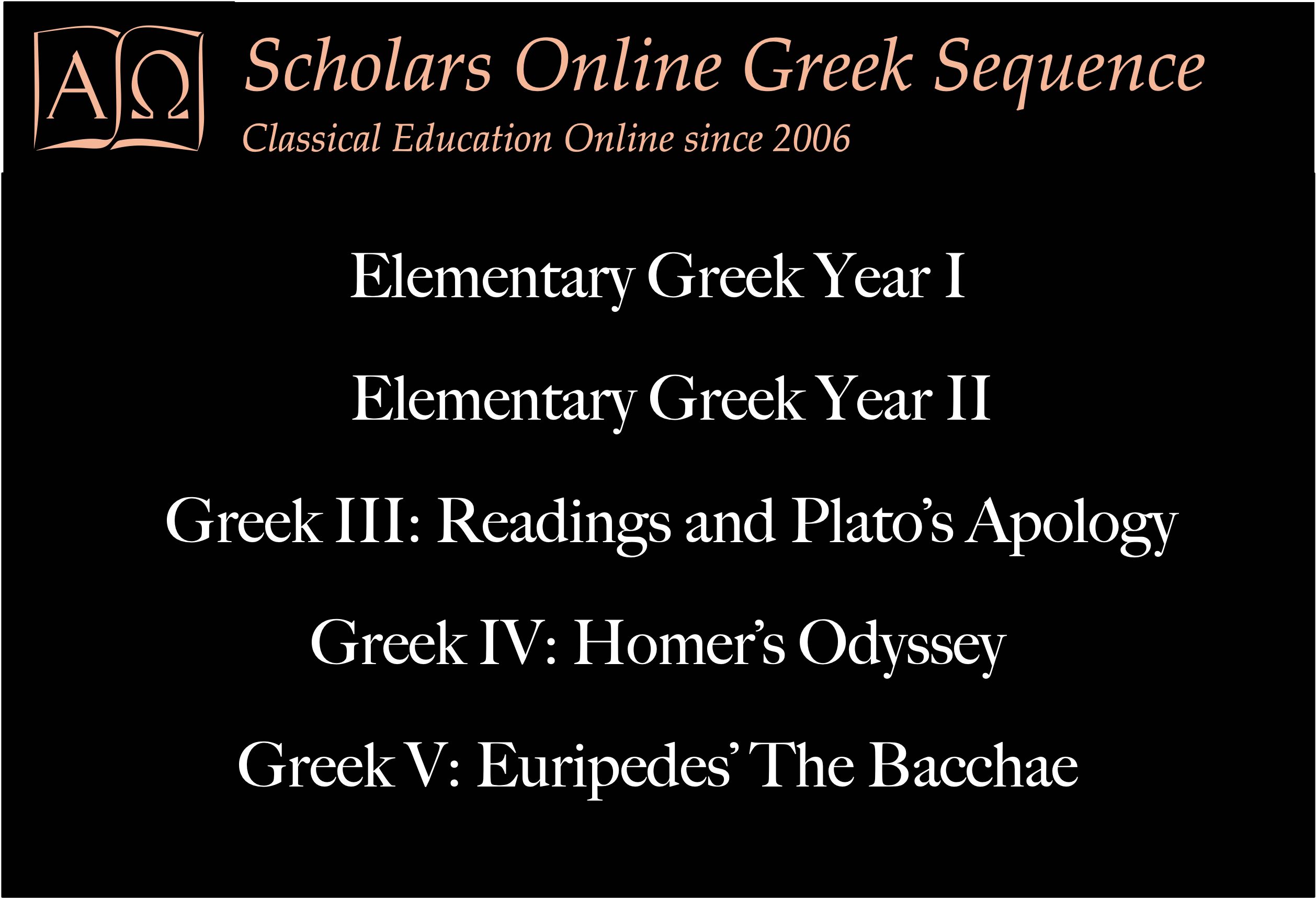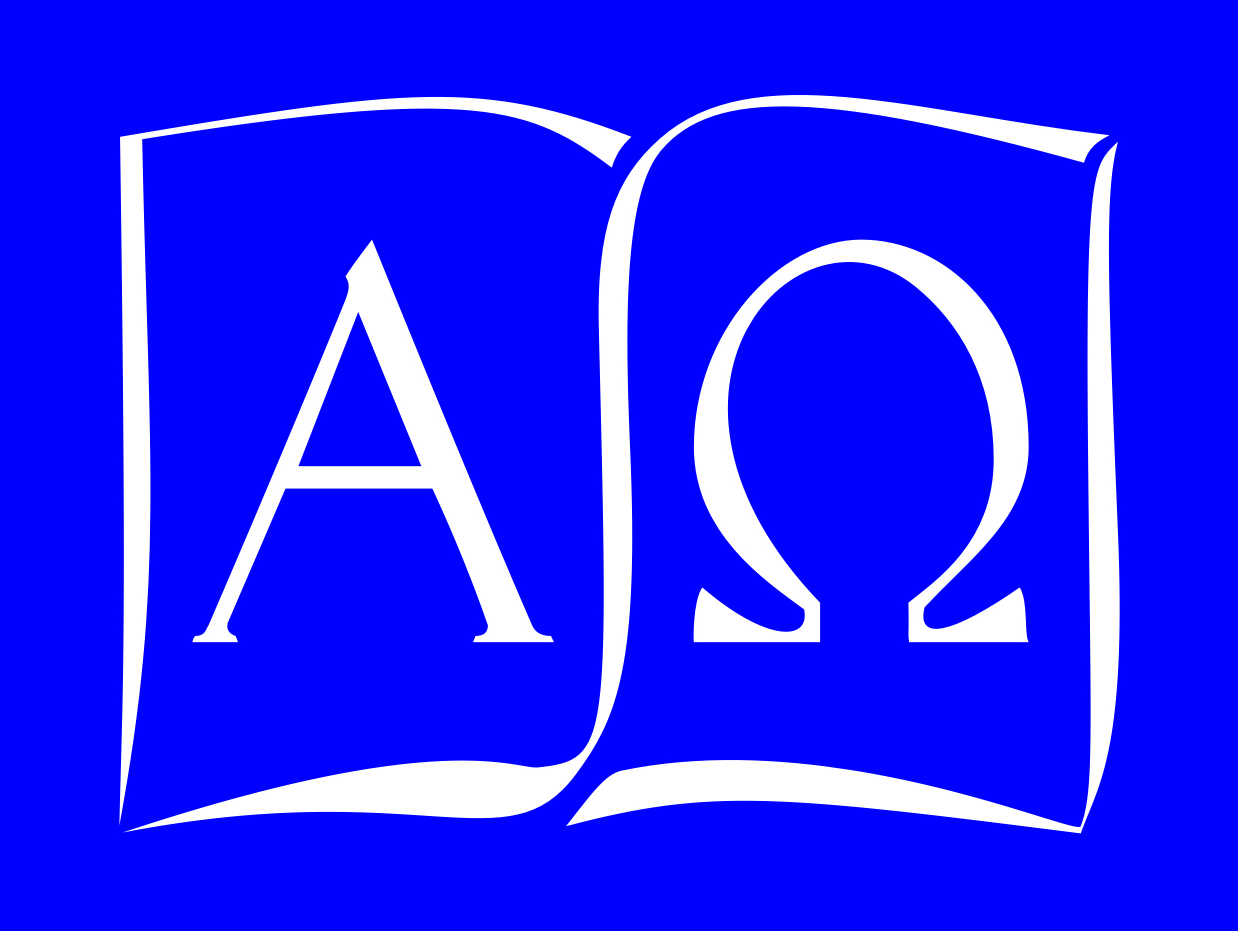Classical Greek Online

Scholars Online Greek Courses Sequence
Available Courses
Greek I and II are currently offered in alternate years. Please contact us if you need a course in an off year,
To enroll in any of our courses, log into your Scholars Online Account Management Center using the login link at the bottom of any page and select the member you wish to enroll. If you do not have an account, you may create one using the Becoming a Member link under Enrollment in the Navigation bar at the top of this page.
If you are interested in a course not yet offered for this year, please use the EMAIL US link below to contact Scholars Online Administration with your course request.
Few schools these days offer classical Greek online or do so beyond a basic introduction, but at Scholars Online, you can learn to read Greek well enough to tackle the New Testament, Plato's Dialogues, and Homer's Odyssey, and even explore the plays of Euripedes in our ancient Greek online course sequence.
Why Study Ancient Greek?
Classical Greek is generally regarded as being more difficult than Latin, and most students who tackle it find it so. It also has compensatorily great rewards, among them the opportunity to wrestle with some intriguing grammatical concepts not found in other western languages, a powerfully expressive vocabulary, the ability to read authors as diverse as Homer and Thucydides in their original tongues, and finally, for the Christian student, access to the New Testament in its original form. The study of Greek requires -- and helps develop -- perseverance, attention to detail, and a certain flexibility of mind about how ideas can be expressed.
Some whose interests are chiefly theological concern themselves only with New Testament Greek, but Scholars Online specifically teaches Classical Greek, beginning from the Attic form of the language (that of Athens and the surrounding areas in the "Golden Age" -- i.e., the 5th-4th Centuries B.C.). Here are our reasons:
- Attic Greek is the most fully developed form of the language; the koine Greek of the New Testament is effectively a subset of Attic, widely promulgated as a tool of policy by Alexander the Great. For the student taught only koine Greek, the great works of classical literature -- Herodotus, Thucydides, Plato, Sophocles, Aeschylus, Homer, and others -- will remain impenetrable; but those who can read Attic Greek can read the New Testament with virtually no difficulty.
- The mission of Scholars Online is to promote classical Christian education, and the range of that term takes in both the Christian and the classical sources. A tool providing access to both is more flexible and conducive to our overall purpose.
- The intellectual rigors of Classical Greek are not equally present in other forms of the language. Despite their indisputable importance, the New Testament scriptures are for the most part written fairly simply. Homeric Greek offers a certain unique magnificence, once its formulae and rhythms are mastered, but its constructions are simpler overall.
The Scholars Online Greek program does not presuppose that the student has already studied Latin, but it will complement Latin instruction. We have attempted to help the student understand how the languages developed from Indo-European ancestors, and how the case and tense structures, when seen in this light, can provide a deeper understanding of both languages.
In general, we do not recommend beginning Greek and Latin simultaneously, but it should be possible to begin one one year and a second the next, if the first is going well enough. Those students barely hanging on to Latin, though, should probably not commit themselves to Greek as well until they have the Latin under control.
Program Overview
The basic curriculum for Greek runs four years, and we will present courses as they are required, depending on enrollment. Demand for Greek at the high school level is low, even in the classical homeschooling community, and some years have not offered enough students to make a starting class feasible.
Advanced Greek courses (V-VII) are available, and have been offered through the seventh year. They are virtually never economically feasible to teach, however, since we seldom have many students at that level who haven't already left for college. Accordingly we offer these courses to continuing students who have already worked with us: it is unlikely that we will open a session of Greek V, VI, or VII for a student who has not been with us for several years already.
Our fundamental pedagogical approach is deductive. There are inductive Greek programs available elsewhere (most notably using the textbook Athenaze), but the more traditional deductive model serves our purposes better, both in terms of enabling the student to acquire a disciplined handle on the language, and in developing those analytical habits of mind that classical language instruction is supposed to provide. The first two years (the equivalent of a five-day-a-week college course for one year) cover the elements of the language thoroughly. By the end of the first year the student should be able to read the New Testament reasonably well; by the end of the second the student is tackling passages of Plato and Aristotle, Euripides and other authors in their original forms, with the help of notes. The next year is devoted to expanding reading fluency, using a selection of chiefly Attic authors; the fourth turns to Homeric Greek, with readings from the Odyssey, at approximately the same level as an Advanced Placement Latin course in Vergil's Aeneid. Subsequent courses are more flexible, and cover drama and philosophy.
Class Examples
In order to prevent disruption of the teacher's curriculum and to secure the student learning environment, Scholars Online does not allow non-members to visit live class sessions. We have, however, included a log from an actual chat session, changing only student names to protect their privacy. The content and flow of the course discussion has been preserved, so that you can get a sense of how the chat environment works. Note that while this is a non-audio class, students and teachers may enter HTML tags and unicode characters (unlike simple IRC sessions), and the log is preserved for student review.
 Scholars Online is fully accredited through the Middle States Accreditation Commissions on Elementary and Secondary Schools.
Scholars Online is fully accredited through the Middle States Accreditation Commissions on Elementary and Secondary Schools.
Hosted on Interserver


